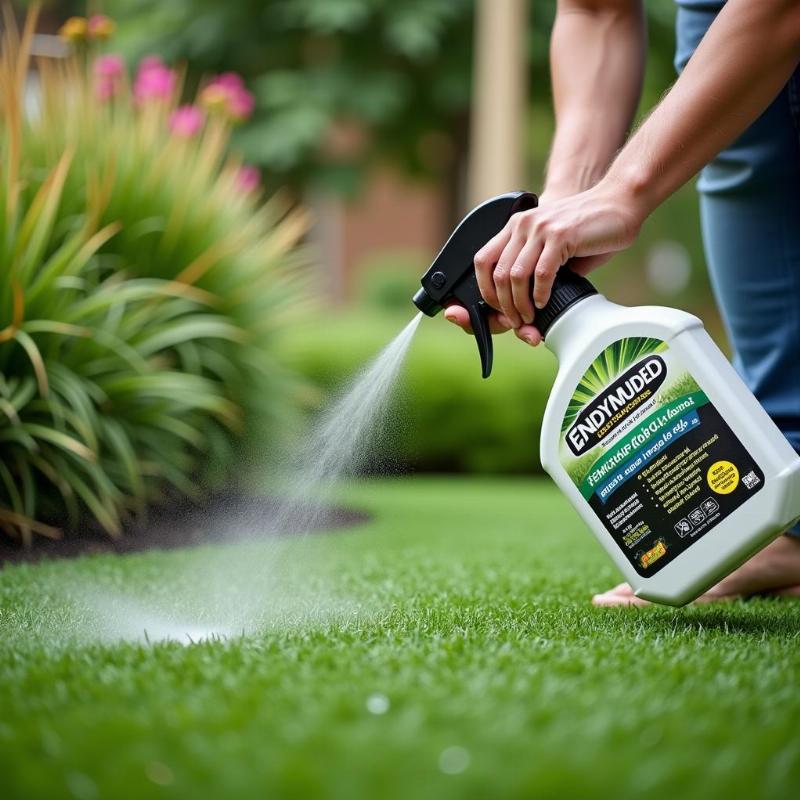Synthetic grass offers a low-maintenance, aesthetically pleasing alternative to natural lawns, especially for dog owners. However, one common concern is the lingering smell of dog urine. This guide dives into the causes of synthetic grass dog urine smell and provides practical, effective solutions for US pet owners.
Understanding the Source of the Smell
The primary culprit behind that unpleasant synthetic grass dog urine smell isn’t the urine itself, but bacteria. Dog urine contains uric acid, which doesn’t evaporate easily. When uric acid crystals come into contact with moisture, bacteria thrive, breaking down the uric acid and releasing ammonia, the source of the pungent odor. Synthetic grass, with its porous backing and infill, provides an ideal environment for these bacteria to multiply.
Effective Solutions for Eliminating Dog Urine Odor
Tackling synthetic grass dog urine smell requires a multi-pronged approach. Here’s a breakdown of proven methods:
Regular Rinsing
Regular rinsing with water is the first line of defense. This helps dilute urine and wash away some of the uric acid before bacteria can take hold. Aim for rinsing the affected area at least once a week, or more frequently if your dog urinates in the same spot regularly.
Enzymatic Cleaners
Enzymatic cleaners are specifically designed to break down uric acid at a molecular level, eliminating the source of the odor. Choose a pet-safe enzymatic cleaner formulated for artificial turf. Follow the manufacturer’s instructions for application and dwell time.
 Enzymatic Cleaner for Synthetic Grass
Enzymatic Cleaner for Synthetic Grass
Baking Soda and Vinegar
For a more natural approach, a mixture of baking soda and vinegar can help neutralize odors. Sprinkle baking soda over the affected area, let it sit for a few minutes, then rinse with a solution of equal parts water and vinegar. This combination helps to break down uric acid and deodorize the area.
Infill Replacement
Over time, the infill of synthetic grass can become saturated with urine and bacteria, even with regular cleaning. Replacing the infill periodically can significantly reduce lingering odors and maintain the hygiene of your artificial lawn.
Choosing the Right Synthetic Grass
When installing new synthetic grass, consider opting for products specifically designed for pet owners. These often feature enhanced drainage and antimicrobial properties, making them more resistant to urine odor.
Preventing Future Odor Problems
Prevention is key to maintaining a fresh-smelling synthetic grass lawn. Here are some proactive measures:
Designated Potty Area
Training your dog to use a designated potty area, either on natural grass or a specific section of your synthetic lawn, can make cleaning and odor control much easier.
Increased Water Intake
Encouraging your dog to drink more water can dilute their urine, making it less concentrated and less likely to cause strong odors.
Dietary Supplements
Certain dietary supplements can help reduce the concentration of uric acid in your dog’s urine, minimizing odor problems. Consult with your veterinarian before adding any supplements to your dog’s diet.
Conclusion
Dealing with synthetic grass dog urine smell doesn’t have to be a constant battle. By understanding the causes and implementing the right strategies, you can keep your artificial lawn fresh and odor-free, providing a pleasant environment for both you and your furry friend. Regular cleaning, enzymatic cleaners, and proactive measures are key to conquering this common challenge.
FAQ
- How often should I clean my synthetic grass if I have a dog? Rinsing should be done at least weekly, and enzymatic cleaning as needed.
- Is it safe to use bleach on synthetic grass? Avoid using bleach as it can damage the grass fibers.
- Can dog urine stain synthetic grass? While less common than natural grass, staining is possible, especially with lighter-colored turf.
- What type of infill is best for dog owners? Zeolites and other antimicrobial infills are designed to combat odor.
- Are there any health risks associated with dog urine on synthetic grass? Ammonia buildup can cause respiratory irritation in both humans and pets.
- What if the smell persists despite cleaning? Consider professional cleaning or infill replacement.
- Can I use a regular hose to rinse the grass? Yes, a regular garden hose with a spray nozzle is sufficient.
Related Articles on Beautdogs.us
Beautdogs.us is your premier resource for all things dog-related in the US. We offer expert advice on dog breeds, care, and products. Whether you’re a seasoned dog owner or just starting out, Beautdogs.us provides trustworthy information to help you navigate the joys and challenges of dog companionship. Contact us for personalized guidance: Email: [email protected], Phone: +1 501-555-7529. Visit Beautdogs.us today!